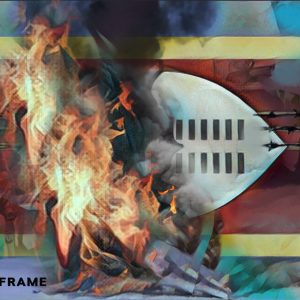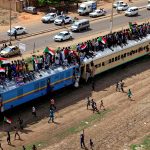People resist the coup in Sudan
On Monday morning Sudanese trade unions and people’s movements called for strikes and mass protests in response to a military coup. Prime minister Abdalla Hamdok has been arrested, along with key c…
Author:
26 October 2021

Over a million people have taken to the streets in cities and towns across Sudan to resist the military coup that took place on the morning of Monday, October 25, sources said. Following the arrest of the prime minister and civilian leaders who were sharing power with the military in the transitional government, army chief Lt. Gen. Abdelfattah El Burhan has announced its dissolution and declared a state of emergency. He has also indicated that a government of technocrats will be set up to take its place.
However, the streets are still held by the protestors. In the capital Khartoum, the army has opened fire at the protesters who gathered en masse outside its headquarters. Most of the main roads and bridges to enter or exit the city are reportedly blocked by the soldiers, while the protesters are barricading the roads within.
In Khartoum’s twin city Omdurman, security forces stormed the state radio and television headquarters and detained a number of employees, following which the state TV has reportedly been playing patriotic songs and showing images of the Nile. Internet connectivity has been suspended.
Related article:
Images of angry protesters raising revolutionary slogans and marching on the main roads over a backdrop of thick black smoke rising from burning tires blocking the highways in various parts of the country are emerging on social media, despite the net blockade.
Calling for occupation of the streets, the Sudanese Communist Party (SCP) and its affiliated trade unions and neighbourhood resistance committees declared a political strike and total civil disobedience when the coup began.
According to a statement from the Prime Minister’s office, PM Abdalla Hamdok and his wife were “kidnapped from their residence in Khartoum, and were led to an unknown destination by a military force”. The Ministry of Information said that after surrounding his residence, the military attempted to force him to sign a statement approving its takeover, and arrested him upon his refusal to comply.
Other cabinet ministers and civilian leaders sharing power with the military generals in the transitional government’s highest body, the sovereignty council, have also been arrested. According to reports, leaders currently in military custody include the sovereignty council’s spokesperson Mohammed al-Fiky Suliman, Khartoum’s governor Ayman Khalid, Industry Minister Ibrahim al-Sheikh, Information Minister Hamza Baloul and the Prime Minister’s media advisor Faisal Mohammed Saleh.
Related article:
The Sudanese Professionals Association (SPA) have appealed “to the masses of the Sudanese people, their revolutionary forces, and the resistance committees in neighbourhoods in all cities and villages to take to the streets and completely occupy them… and block all roads with barricades.”
Calling for a “comprehensive civil disobedience in all professional and service institutions, except for emergency medical conditions”, the Khartoum University Professors’ Union have announced that all faculty members have joined the strike.
The Executive Committee of the Sudanese Pilots Union has also declared a “general strike and civil disobedience” and called on “all pilots and workers in the airfield to take to the streets and protect the Sudanese people’s revolution”. The airport in Khartoum is reportedly closed and international flights have been suspended.
Monday’s coup comes less than a month after a similar attempt last month by a section of officers, following which the military blamed the civilian administration for failing to do its work and for causing unrest in the country.
Not the end of the December Revolution
While the cabinet ministers and other civilian leaders in government are in military custody and the army chief has announced his intention to form a new government, it would be premature to declare an end to the December Revolution that led to the overthrow of long-time dictator Omar al-Bashir in 2019.
The military elite “didn’t understand that the December revolution was rooted in the awareness and will of the Sudanese and that those who guard it are the masses of these people who will defeat today’s adventure… their struggles will not stop without the full transfer of power to civil authority,” the SPA said.
Deriding the army chief Burhan of being “disconnected from reality”, the SPA said that by making this attempt to seize power, “Burhan has written his own end” and will face the “wrath of the people”.
However, there is much danger on the road ahead for the revolutionary forces. The “class of internet disruption” presently used in Sudan “affects connectivity at the network layer and cannot always be worked around with the use of circumvention software or VPNs”, NetBlocks has reported. Concerns that atrocities may be committed under the cover of this information blackout are real.
The watchdog added in its report that a “more extensive mobile internet shutdown [had] left Sudan offline for 36 days from 3 June to 9 July 2019”. June 3 2019 was the day when the massive sit-in demonstration outside the army headquarters in Khartoum was dispersed with the use of the notorious Rapid Support Forces (RSF) militia, which massacred over a hundred protesters.
Related article:
It was following this massacre that the centrist and right-leaning political parties compromised with the military and struck a power sharing deal, making way for the transitional government that was dissolved on Monday.
Objecting to this compromise, the SCP, SPA and resistance committees refused to take part in the government, but have continued to exert pressure on the civilian leaders in it to subjugate the military. They have also mobilized the masses in defence of the government every time it has been threatened by a military takeover.
However, as these civilian leaders, backed by the centrist and right-wing parties, continue their hesitation in confronting the military, the forces of the December Revolution made it clear during the ‘March of Millions’ last week that the masses will confront the military directly on the streets.
With the government now dissolved, this confrontation has begun.
After firing at the protesters outside the army headquarters in Khartoum who had sought to occupy the square where the June 3 massacre was committed, the SPA called on them to “avoid heading to leadership, palace or any other central point at the moment”.
Urging people to instead organise sit-ins in neighbourhoods, and to block the main roads, the trade unions federation explained, “we need to gather rows in our positions and paralyze the coup movement through the barricades”.
Update: At time of writing, a state of emergency has been declared.
This article was first published by People’s Dispatch.



